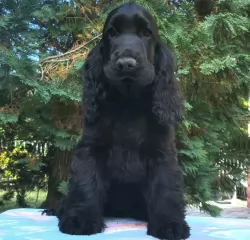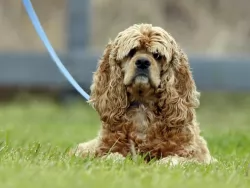 MyDogBreeds
MyDogBreeds Pomeranian is originated from Germany but American Cocker Spaniel is originated from United States. Pomeranian may grow 12 cm / 4 inches shorter than American Cocker Spaniel. Pomeranian may weigh 10 kg / 22 pounds lesser than American Cocker Spaniel. Both Pomeranian and American Cocker Spaniel has almost same life span. Both Pomeranian and American Cocker Spaniel has almost same litter size. Both Pomeranian and American Cocker Spaniel requires Moderate maintenance.
Pomeranian is originated from Germany but American Cocker Spaniel is originated from United States. Pomeranian may grow 12 cm / 4 inches shorter than American Cocker Spaniel. Pomeranian may weigh 10 kg / 22 pounds lesser than American Cocker Spaniel. Both Pomeranian and American Cocker Spaniel has almost same life span. Both Pomeranian and American Cocker Spaniel has almost same litter size. Both Pomeranian and American Cocker Spaniel requires Moderate maintenance.
 Pomeranian dog Known as the Pom and classified as a toy dog breed, the Pomeranian comes from the Spitz dog from the Arctic regions. It is thought that the dog is descended from larger Spitz-type dogs, and more specifically the German Spitz.
Pomeranian dog Known as the Pom and classified as a toy dog breed, the Pomeranian comes from the Spitz dog from the Arctic regions. It is thought that the dog is descended from larger Spitz-type dogs, and more specifically the German Spitz.
It appears to be an ancient dog breed because there are recordings of its existence from 1764 already. This little dog is thought to have got his name from the area known as Pomeranian in Northern Poland as well as along the Baltic Sea, Germany.
The first breed club for this dog was established in England in 1891. Not long afterwards the first breed standard was written. In the standard published in 1998, The Pomeranian Dog is categorized in the German Spitz standard.
 Descended from the English Cocker Spaniel when the latter were brought to the United States in the late 1800s. American hunters wanted a smaller dog for bird hunting, so they crossed them with smaller spaniel breeds. The English and the American Cockers were considered the same breed until 1935 when the American Kennel Club officially separated them into 2 distinct breeds. After this the American Cocker’s popularity increased dramatically.
To this day they are one of the most popular breeds in the U.S. Recently their popularity has spread back to England. The American Cocker Spaniel has evolved from a hunting dog life to a very popular family pet.
Descended from the English Cocker Spaniel when the latter were brought to the United States in the late 1800s. American hunters wanted a smaller dog for bird hunting, so they crossed them with smaller spaniel breeds. The English and the American Cockers were considered the same breed until 1935 when the American Kennel Club officially separated them into 2 distinct breeds. After this the American Cocker’s popularity increased dramatically.
To this day they are one of the most popular breeds in the U.S. Recently their popularity has spread back to England. The American Cocker Spaniel has evolved from a hunting dog life to a very popular family pet.
 This is such a sweet little dog, full of good cheer and with such a bright little face. He weighs between 1.5kg and 4kg and stands at anything between 17 and 28cm in height.
This is such a sweet little dog, full of good cheer and with such a bright little face. He weighs between 1.5kg and 4kg and stands at anything between 17 and 28cm in height.
He is such a compact little fluff ball with sharp erect ears and a fox like appearance with a well feathered tail that curls up over the dog’s back.
The coat is thick and spritely, not lying flat but standing up around the dog. Coats can be nearly any color, but the most common is tan, reddish, orange or you get a mix of cream tan and black.
When you look into the bright little face of the Pomeranian Puppy, you can see that he is a true extrovert. He is social and has a huge personality. They’re bright, eager, feisty, loving and loyal.
Full of fun and very intelligent, they may be small and cute, but training and socialization will do him the world of good as it means you can take him anywhere with you and he’ll be well behaved. They grow attached to their owners and want to protect them.
They can be somewhat aloof with strangers and its this wariness around them that makes them good watchdogs. They get on well with children in the home and are prepared to make friends with other pets in the family too.
 The American Cocker spaniel is a sturdy dog of medium size. The have a rounded head with a broad and deep muzzle. The jaw is even and square while the teeth have a scissors bite. The American Cocker has round eyes that are almost always dark with the exception of the Merle who can have blue colored eyes. They have long ears and a docked tail in the U.S. Docking is illegal in most of Europe. The American Cocker bred for field hunts have shorter coats than those bred for show. Grooming is essential for this longhaired breed. It is especially important for the eyes and ears to be kept clean.
The American Cocker spaniel is a sturdy dog of medium size. The have a rounded head with a broad and deep muzzle. The jaw is even and square while the teeth have a scissors bite. The American Cocker has round eyes that are almost always dark with the exception of the Merle who can have blue colored eyes. They have long ears and a docked tail in the U.S. Docking is illegal in most of Europe. The American Cocker bred for field hunts have shorter coats than those bred for show. Grooming is essential for this longhaired breed. It is especially important for the eyes and ears to be kept clean.
 Pomeranians are such bright, friendly little dogs and they’re also active. These loving dogs are also intelligent so you can easily teach him some simple commands such as sit or lie down.
Pomeranians are such bright, friendly little dogs and they’re also active. These loving dogs are also intelligent so you can easily teach him some simple commands such as sit or lie down.
He won’t want to lie down for too long though because he’s full of beans.
He’s alert too so he makes a good watchdog. When you bring one of these dogs into your home as a pet and companion animal, you won’t be disappointed as he’s got a whole lot of love to give.
 This is a gentle, happy dog. They are high energy, high spirited, friendly dogs who like people and other animals alike. They are happy to be with you and want to please you. He can find a home in the country and in the city alike. He is inquisitive and easy to train.
This is a gentle, happy dog. They are high energy, high spirited, friendly dogs who like people and other animals alike. They are happy to be with you and want to please you. He can find a home in the country and in the city alike. He is inquisitive and easy to train.
But be warned they can be stubborn and hard to housebreak. They can be shy and need a lot of socialization as a pup. They can take over a household if you are not the strong pack leader they need. They have a tendency to urinate when excited and must live inside with the family. They are far too social to be left outside. An unhappy, unstable cocker can be into resource guarding of things, spaces and people. They can bark obsessively or be hyperactive. They must have a loving home with the family.
 Your little Pomeranian Puppy is a sturdy dog who isn’t going to battle too much with health issues. With good care such as good food and exercise, the Pomeranian can reach 12 – 16 years of age.
Your little Pomeranian Puppy is a sturdy dog who isn’t going to battle too much with health issues. With good care such as good food and exercise, the Pomeranian can reach 12 – 16 years of age.
Some of the most common health issues you might come across
This problem comes about when the ridges which form the patella groove in the knee aren’t deep enough to allow the patella to sit securely. This causes the patella to move out of the groove. While the muscles are contracted, the patella isn’t able to return to the correct position.
Pomeranians Dogs are prone to quite a few eye problems such as tear duct problems and cataracts. As a responsible dog owner, take your pet to the vet if you suspect eye problems.
The trachea carries air to the lungs and it can collapse. Your dog will have a chronic, dry cough and this can be brought about when people tug on their dog's leash.
Every little dog battles with teeth and gum problems which can lead to early tooth loss. When you brush your Pomeranian, make a point of checking inside his mouth too, as a bad tooth can cause pain but also all kinds of health problems.
 Perhaps the least of the American Cocker Spaniel’s health concerns are the tendency to overeat and become obese. The more serious concerns include glaucoma, cataracts, dysplasia, allergies, Cherry eye, lip fold pyoderma, liver disease, cardiomyopathy, and congestive heart failure (CHF).
Perhaps the least of the American Cocker Spaniel’s health concerns are the tendency to overeat and become obese. The more serious concerns include glaucoma, cataracts, dysplasia, allergies, Cherry eye, lip fold pyoderma, liver disease, cardiomyopathy, and congestive heart failure (CHF).
The most serious health issue the breed faces is IMHA or Immune Mediated Hemolytic Anemia which can be deadly. In fact, it is almost always fatal and comes on quickly. With this condition the dog can bleed out internally and there is little that veterinary medicine can do.
 Pomeranians Dogs have a thick, double coat, so you will need to invest in a decent brush so that you can brush him. He is a shedder so this is an important part of grooming. Some people prefer to take the dog to the groomers and have the coat professionally cut.
Pomeranians Dogs have a thick, double coat, so you will need to invest in a decent brush so that you can brush him. He is a shedder so this is an important part of grooming. Some people prefer to take the dog to the groomers and have the coat professionally cut.
Your cute little Pomeranian isn't the kind of dog to spend too much time asleep on the couch. He is energetic and full of beans and he will wait anxiously for you to take down his leash and take him on a walk. In indoors his bright little face will be watching yours to see if there’s any chance of a ball game.
People never know if they should feed their dogs dry kibble, semi-moist or canned dog food. Homemade food is always good, but if you opt to also use commercially manufactured dog food, go for the good quality ones that have vitamins and minerals in them.
Every dog needs a good balance of protein, carbs, minerals, fats, vitamins and trace elements. People often get all worked up over feeding their pets when it can be so simple.
Use a high quality dry kibble, but now and then add some home-made cooked food into it as a treat – about once or twice a week. Boil some chicken, brown rice, sweet potato, carrots and spinach and add this in to the dry kibble.
Every now and then a little bit of raw meat will also do your pet the world of good. What could be more simple than this? Nutritious, tasty and healthy, and your pet will thrive on it.
Make sure he always has a bowl of fresh, cool water close by.
 The American Cocker Spaniel breed requires attention to detail and making sure your puppy gets enough and your adult doesn’t get too much. Feed the pups twice a day until they reach the age of 4 months and then cut them back to the adult dose of once a day at supper time. Feed from a cup to a cup and a half.
The American Cocker Spaniel breed requires attention to detail and making sure your puppy gets enough and your adult doesn’t get too much. Feed the pups twice a day until they reach the age of 4 months and then cut them back to the adult dose of once a day at supper time. Feed from a cup to a cup and a half.
not previously mentioned include Ectropion and Entropion, Prolapse of the nicititans gland, gastric torsion and elbow dysplasia. Have your puppy tested for eye diseases and any issues with the knee and hip. These are social dogs and will not do well alone outside. They need to live inside.
The American Cockers love to play and need a lot of exercise. Nice long walks, games of fetch or even agility will keep your Cocker happy. have plenty of stamina and need regular exercise. They also enjoy a good hunt.